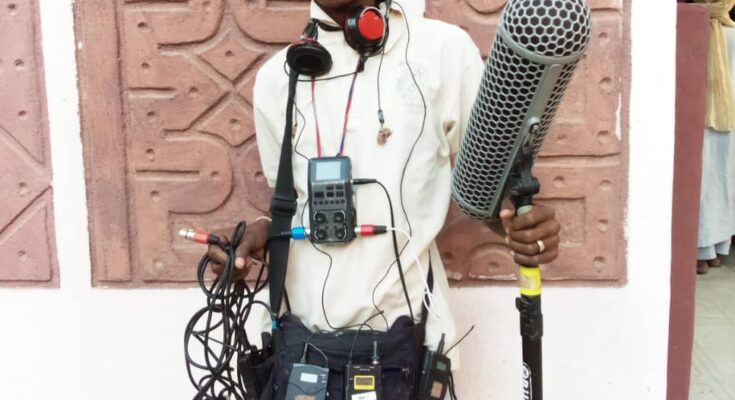Muhammad Abdullahi Uzairu, also known as Sanin Innna Maskwani, is a professional sound engineer in Kannywood. In his interview with IBRAHIM HAMISU in Kano, he speaks about his 13-year sojourn in the film industry.
Background
My name is Muhammad Abdullahi Uzairu, but I’m better known as Sanin Innna Maskwani. I’m from Kano state, born and raised here, and I’ve spent my entire life in this city. I was born, raised, and educated here, and I’ve been living here all my life.
I began my journey through Habibu Sani, a mentor, who taught me the basics of film-making. I started by learning camera operation, lighting, and make-ups before specialising in sound engineering. I met him while working on short films on Fiqh and Tauhidi for the benefit of the community, which we are still doing.
When did you start your career in Kannywood?
I started between 2011 and 2012, learning various aspects of film-making before focusing on sound engineering. I started by learning camera, light, and make-ups, and then I went back to learning editing and sound together.
Could you explain the importance of sound-recording in film-making?
Sound-recording is crucial in film-making. A sound engineer needs essential tools like a zoom recorder; boom mic; a long pole for attaching the zoom mic; a windscreen to prevent wind noise, and a radio mic. We also need a phone to connect the mic and zoom.
What challenges have you faced in your career so far?
Some producers prefer to outsource sound-recording, which can limit opportunities for sound engineers like myself. However, I believe there are many sound engineers in the industry, and our work is essential. Sometimes, producers prefer to work with a sound recorder from outside, which is why some people think there is a lack of sound engineers in Kannywood. But there are many of us, and wherever a film is taken, there must be sound recorders.
You’ve achieved success in teaching others and working on numerous projects. Could you mention some of your notable works?
Yes, I’ve worked on films like Uku Sau Uku; Anti Daba; Mizani Buri; Bilkisu TV series; Lulu da Andalu Sabon Salo; Kalma Daya; Zaluma, and Ruwan Dare Radio drama. These are just a few examples, and I’ve forgotten many others.
Who has been your mentor and role model in the industry?
Habibu Sani has been my mentor and role model. He’s guided many others in the industry, and I credit him for my success. He’s a person who has given me advice that has helped my life. I’m not the only one; Habibu Sani has raised many people who are outstanding in the industry. Even if you go to him now, he will protect you with some things about film, radio, and TV programmes. And he never gets tired; that’s why I consider him as a father.
What advice do you have for aspiring sound engineers?
I advise them to cultivate interest, calmness, courage, patience, and prayer to succeed in their careers. With dedication and hard work, anyone can achieve their goals in the film industry. The advice is to be interested in the work in the heart, then calmness, courage, as well as patience in learning the work and accompanying it with prayers. Anyone who embraces these things will succeed in everything in his life.
Finally, what’s your hope for the future of the Hausa film industry?
I hope for the industry to stand on its own feet and for professionals to support each other. I believe we have the potential to grow and develop, and I’m committed to contributing to that growth. My wish is for the Hausa film industry to stand on its own two feet. Then let’s love each other and take care of each other’s rights. God-willing, the blessing and value of the film industry will come back in the development of Arziki. We have nothing to lose in Kannywood except the money that will turn things around.




